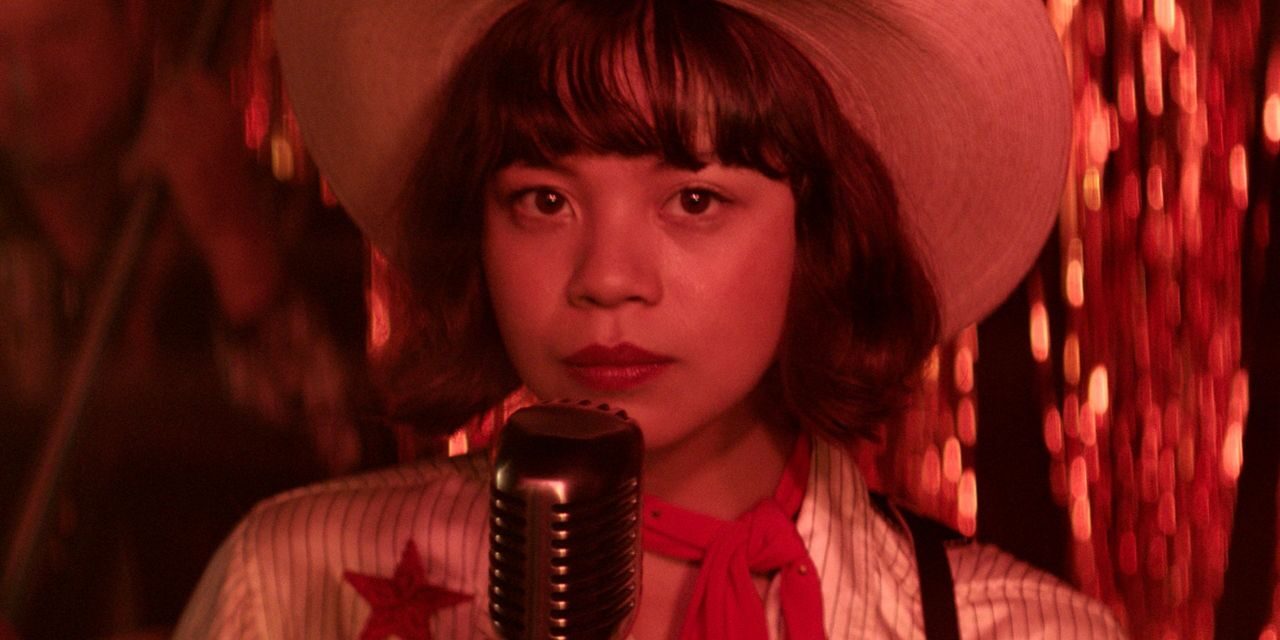Rose Garcia (Eva Noblezada) is a 17-year-old Filipina teen with a dream. A dream where her love for country music can make a way for her out of a small Texas town. She takes a liking to records by Patsy Cline and Van Zandt. She has a guitar given to her by her late father and candles illuminate pictures of them together when she was younger. Her room is a sanctuary for family and musical legends. In the opening minutes of Yellow Rose, the lyrics of ‘Square Peg’ would become a motif for the movie ahead: ‘Square peg, round hole/Like a tumbleweed with nowhere to go/Square peg, round hole/A runaway with nowhere to go’
Director, producer, and screenwriter Diane Paragas presents a microcosmic look at America and how some get to experience it. Given her own background being Filipina growing up in Texas, there’s a level of care and precision to this story that only experiences can provide. Rose stays with her mother Priscilla (Princess Punzalan) who works as a housekeeper at a motel. She knows their immigration status where Rose only is aware of a part of the story. In the short time that they have together, you can feel the apprehension that she has in trying to keep her family unit safe. In conversation, Priscila tells Rose that her father desired more for them. The adage of arriving in America and achieving a better life. Priscila misses The Philippines whereas Rose is a product of Texas, almost as the realization of her father’s dream come to fruition.
Rose confides in friend and eventual love interest, Elliot (Liam Booth) going into Austin to see country singer Dale Watson. Unfortunately, ICE officers show up and take Priscila into custody. From there, one of the most powerful scenes in the film occurs from a dualistic perspective. Priscilla is being checked into an immigration facility, in contrast to Rose running into an open field, letting out her frustration. The camera itself becomes a little shaky, a little out of focus depicting the erratic feeling of Rose’s world turning upside down. August Thurmer prefers to base the cinematography style on close-ups to invoke the heavy emotions in character dialogue. Sometimes this tight style can look beautiful against the Texas skyline. Other times, it can get a little disorienting. As this is a very personal film, it makes the audience feel the anxiety of impermeance from a visual perspective.
Thus, there’s a balancing act between Rose’s relationship with music and seeking a haven because of her immigration status. The movie never allows you to feel comfortable. Moments of serenity occur where Rose is growing into her voice and developing her gift. However, you never feel like there’s a sense of home or rest. A tireless weight of temporary hangs on her. Eva Noblezada’s performance is riveting, as she’s able to exhibit moments of rising confidence and the punishing blows of hopelessness at the drop of a dime. Country music is the right conduit for Rose’s pain. If you think about it, it’s considered one of the most ‘American’ forms of music. Here you have a daughter of immigrants with a powerful voice, using it as a tool to tell the world what she’s going through.
Rose goes from place to place. First to her aunt Gail (Lea Salonga) where her husband is not open to the idea of her staying there. Then to the Broken Spoke Saloon where a lady named Jolene (Libby Villari) where she offers her a room with her working there. Last, it’s with Watson himself in an old RV, and there, she finally has time to put energy into her musical gifts while providing a source of inspiration for him. A conversation happens with Jose (Gustavo Gomez), another undocumented teen, and a cook at the Broken Spoke Saloon. He speaks of always feeling that there’s no moment of relaxation in the quest to make a living. Yellow Rose puts no punches in showing the treatment of the undocumented. Rose’s mother is stripped of her name and given a number as referred by the guards. When she first arrives at the facility, she sleeps on a cold floor with a styrofoam blanket. If this is how the undocumented are treated, you can’t blame Priscila for her surrender to leave America.
In the question of assimilation, Rose and Priscila share a moment at the beginning of the film where they sing a classic Filipino song, ‘Dahil Sa Iyo.’ This reoccurs with Gail singing to her daughter. While Rose doesn’t have specific memories of The Philippines, that song keeps the bond strong with her mother and the lineage that she comes from. There’s a substantial question of who gets to experience what we call ‘The American Dream.’ It becomes a realization to some, but an aberration to others. Country music rings the loudest bells in America’s heartland and is not looked upon as the most inclusive. However, country songs are very direct with their messaging to the listener. Whether it be about falling or love. No matter where Rose went into the movie, the thing that always felt like home was music. It was her center to connect with her family and a cathartic outlet for her experiences. In a world where everything seems to be temporary, the words written in her notebook and vibrations that reverberate from her guitar are her anchors.
Yellow Rose begins with ‘Square Peg,’ which tells the story of a girl who just wants a place to belong. It ends with the triumphant and defiant, ‘I Ain’t Going Down,’ a duet between Rose and Watson. It’s a song of perseverance, not only for a character that has been put through the wringer, but for the people watching this film who are going through the same thing.
Photo Credit: Sony Pictures













